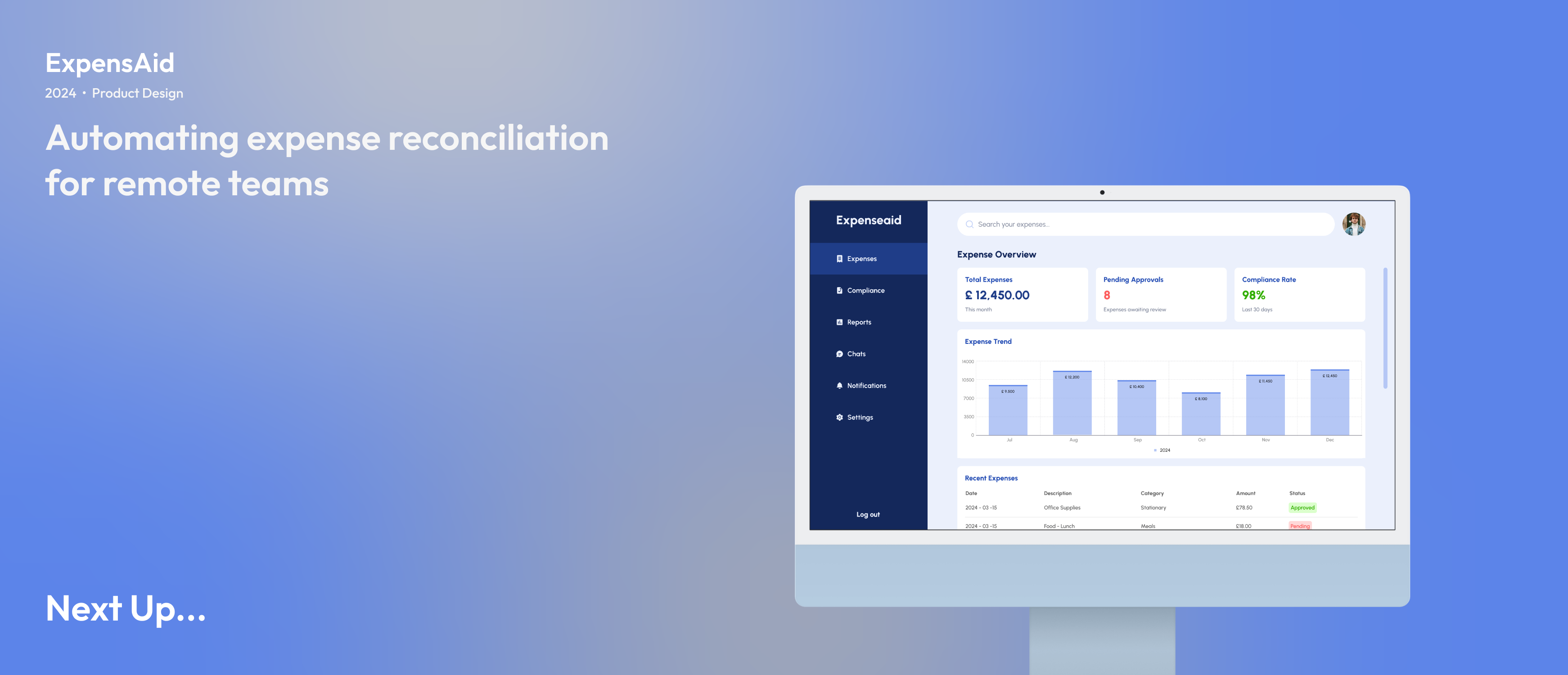CoCravings
CoCravings
Reimagining corporate lunches: How CoCravings design keeps professionals out of queues
Reimagining corporate lunches: How CoCravings design keeps professionals out of queues
Reimagining corporate lunches: How CoCravings design keeps professionals out of queues
Canary Wharf professionals face long lunch queues due to simultaneous break times, leading to frustration as their limited breaks are spent waiting for food. This often results in missed meals, as their breaks end before they can receive their order. Current systems also don’t support group orders from multiple vendors, further complicating the lunchtime experience for teams with diverse preferences.
Canary Wharf professionals face long lunch queues due to simultaneous break times, leading to frustration as their limited breaks are spent waiting for food. This often results in missed meals, as their breaks end before they can receive their order. Current systems also don’t support group orders from multiple vendors, further complicating the lunchtime experience for teams with diverse preferences.
Role
Product Designer
Year
2023
Deliverables
User research
Persona & journey maps
Lo-hi fidelity wireframes
Visual design
Usability testing
Prototypes
Mockups
User research
Persona & journey
maps
Lo-hi fidelity
wireframes
Visual design
Usability testing
Prototypes
Mockups
This is what success looked like…but how?
This is what success looked like…but how?
Reduced onboarding time
The time taken to sign up and invite group members was reduced to an average of 1 minute 30 seconds, surpassing our goal of 2 minutes. Users were able to join group orders faster through invite codes, eliminating delays in setup.
Reduced onboarding time
The time taken to sign up and invite group members was reduced to an average of 1 minute 30 seconds, surpassing our goal of 2 minutes. Users were able to join group orders faster through invite codes, eliminating delays in setup.
Increased task completion rate
I achieved a 95% task completion rate, exceeding the original goal of 90%. Users easily completed group orders, with minimal errors and no need for assistance.
Increased task completion rate
I achieved a 95% task completion rate, exceeding the original goal of 90%. Users easily completed group orders, with minimal errors and no need for assistance.
Quicker time to place an order
The total time to send group orders to the host, and the host completing steps until checkout took just 4 minutes, overpassing our assumptions of 5-7 minutes.
Quicker time to place an order
The total time to send group orders to the host, and the host completing steps until checkout took just 4 minutes, overpassing our assumptions of 5-7 minutes.
Increased navigation efficiency
85% navigation efficiency was recorded, indicating that users navigated through the prototype with ease and minimal backtracking.
Increased navigation efficiency
85% navigation efficiency was recorded, indicating that users navigated through the prototype with ease and minimal backtracking.
Race against time – 80% of Canary Wharf professionals frustrated by long queues and missed meals
Race against time – 80% of Canary Wharf professionals frustrated by long queues and missed meals
Through my research, I found that of Canary Wharf professionals were frustrated by long queues during their lunch breaks, which often led to missed meals. This made it clear that the current lunch-ordering process was too time-consuming and inefficient.
Through my research, I found that of Canary Wharf professionals were frustrated by long queues during their lunch breaks, which often led to missed meals. This made it clear that the current lunch-ordering process was too time-consuming and inefficient.
I needed to create a solution that not only addressed the time constraints but also offered a streamlined way to order from multiple vendors, saving users precious minutes of their lunch breaks.
I needed to create a solution that not only addressed the time constraints but also offered a streamlined way to order from multiple vendors, saving users precious minutes of their lunch breaks.
" By the time I get in front of the line, my break is almost over, 30 mins of break and 15mins of queue! "
" By the time I get in front of the line, my break is almost over, 30 mins of break and 15mins of queue! "
" By the time I get in front of the line, my break is almost over, 30 mins of break and 15mins of queue! "
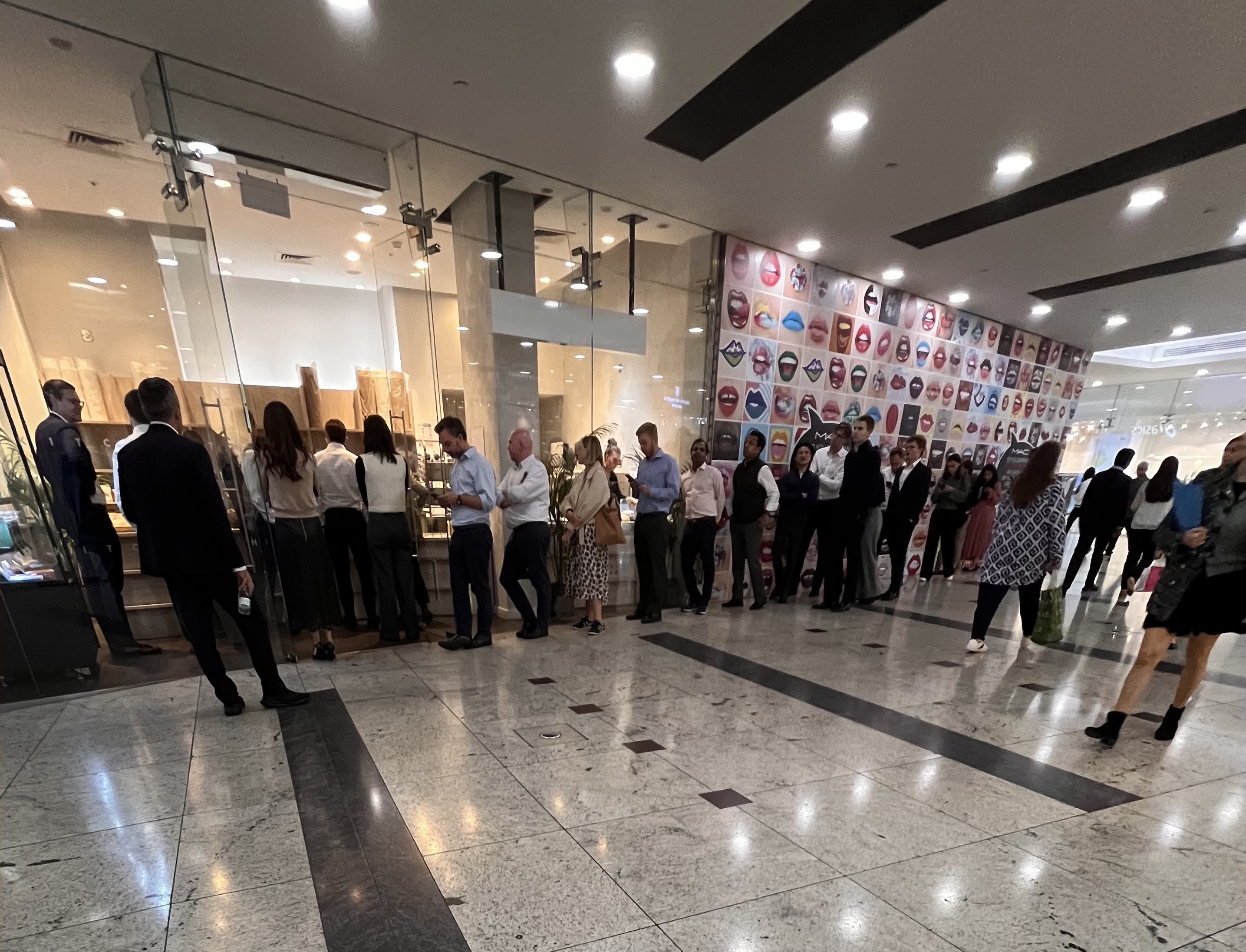
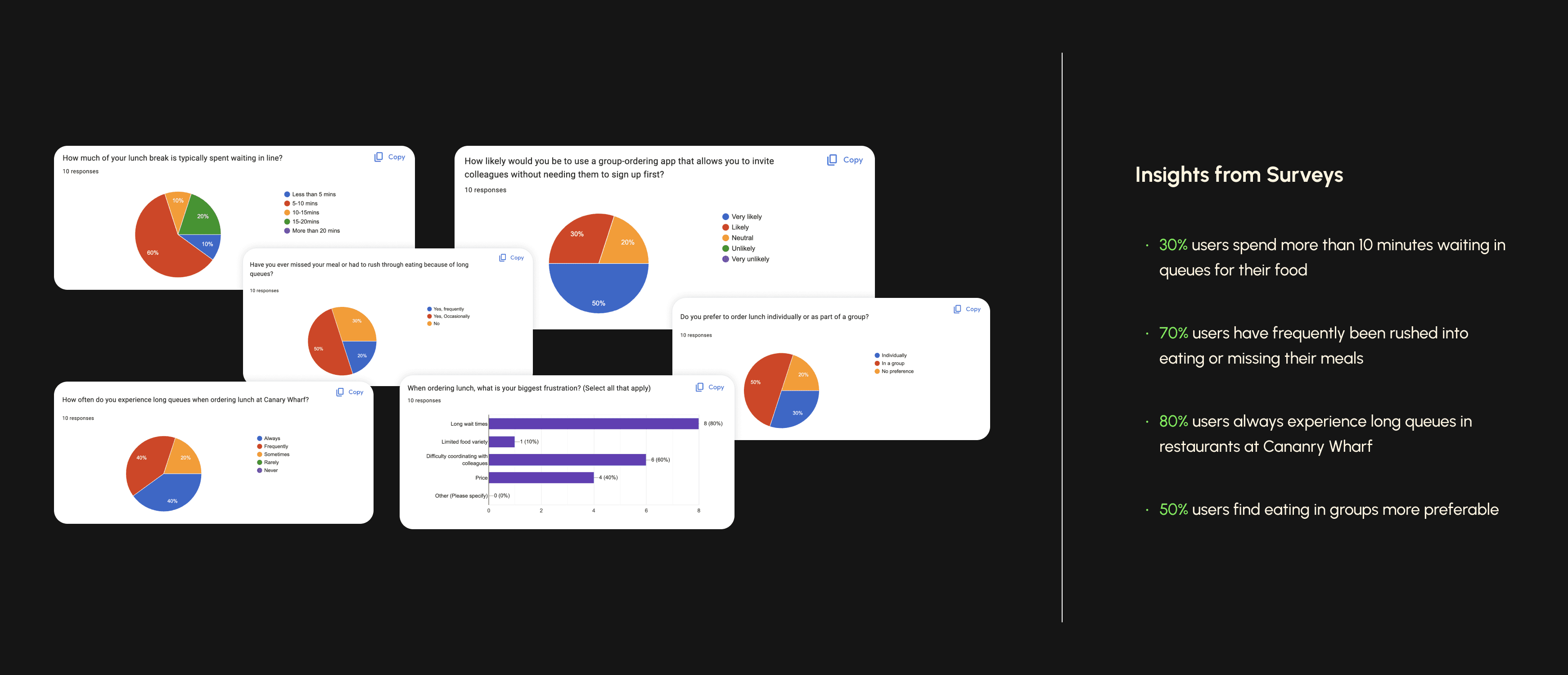
The missing piece – The shift from individual to group ordering
The missing piece – The shift from individual to group ordering
Through in-depth interviews and user observation, I discovered that the need for group ordering was deeply rooted in the social aspect of lunchtime for professionals in Canary Wharf. Many users highlighted that while they often eat lunch in groups, the individual ordering process created inefficiencies and isolated experiences.
Through in-depth interviews and user observation, I discovered that the need for group ordering was deeply rooted in the social aspect of lunchtime for professionals in Canary Wharf. Many users highlighted that while they often eat lunch in groups, the individual ordering process created inefficiencies and isolated experiences.
Teams were coordinating their orders manually, often leading to longer wait times and missed opportunities for team bonding. This shift from individual to group ordering became clear during interviews, as users expressed frustration with the lack of a unified system for placing orders together, especially with diverse food preferences and dietary needs.
Teams were coordinating their orders manually, often leading to longer wait times and missed opportunities for team bonding. This shift from individual to group ordering became clear during interviews, as users expressed frustration with the lack of a unified system for placing orders together, especially with diverse food preferences and dietary needs.
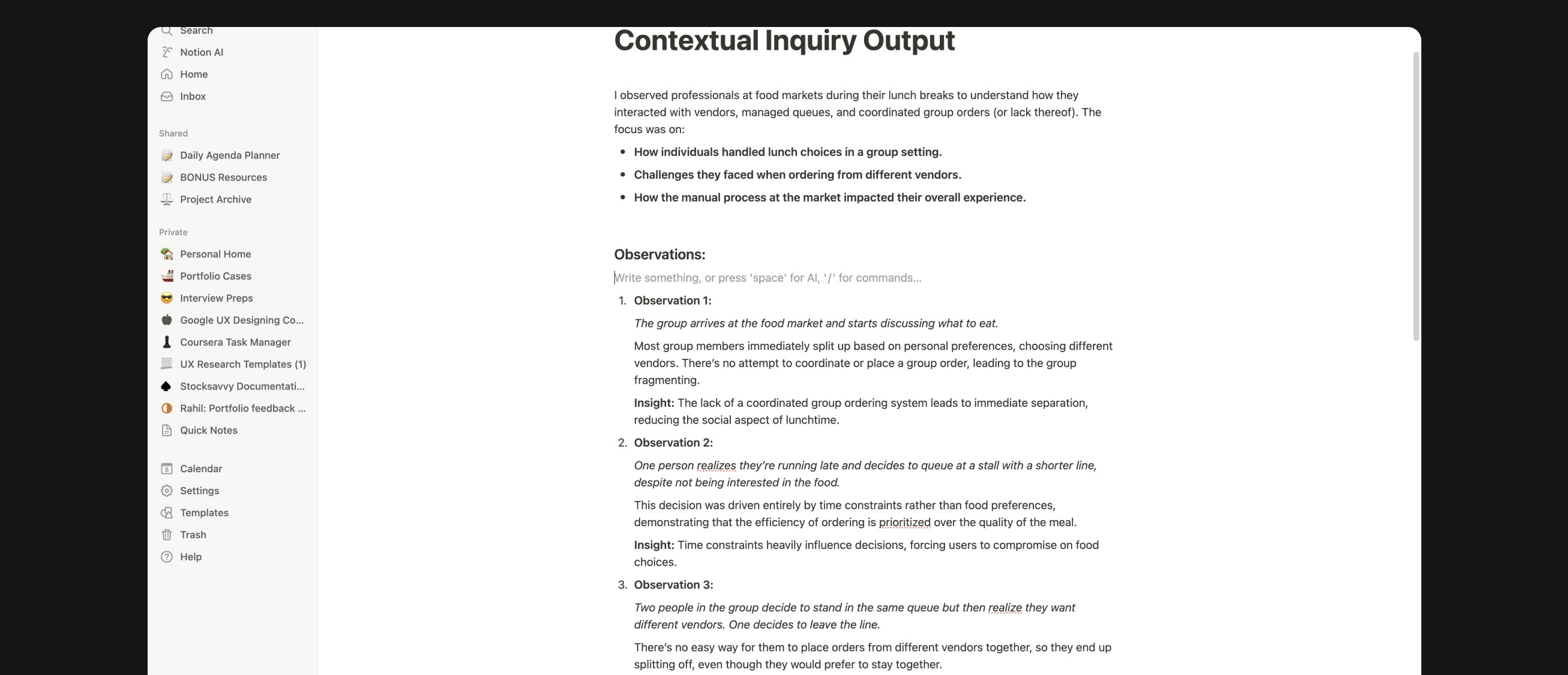
Potential gap in group ordering across diverse vendors
Potential gap in group ordering across diverse vendors
Through competitive analysis, I discovered that existing platforms like Deliveroo and Just Eat don’t offer group ordering across multiple vendors, which is essential for teams with varied dietary preferences.
Through competitive analysis, I discovered that existing platforms like Deliveroo and Just Eat don’t offer group ordering across multiple vendors, which is essential for teams with varied dietary preferences.
This gap presented a significant opportunity for CoCravings. I focused on building a system that enables seamless group ordering from different vendors, simplifying the lunch process and offering flexibility for teams. This became central to the app’s value proposition.
This gap presented a significant opportunity for CoCravings. I focused on building a system that enables seamless group ordering from different vendors, simplifying the lunch process and offering flexibility for teams. This became central to the app’s value proposition.
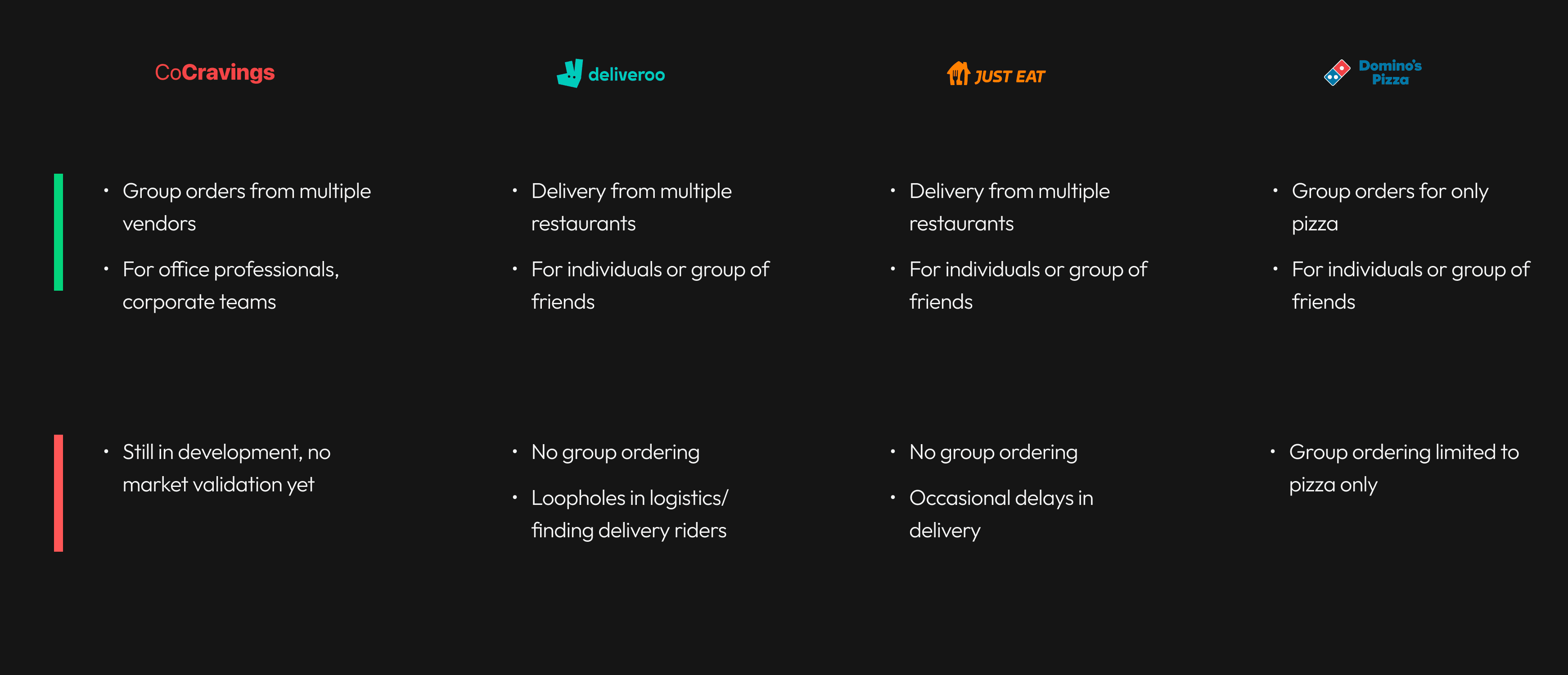
Speed and convenience drive user preferences, including simplified onboarding
Speed and convenience drive user preferences, including simplified onboarding
During ethnographic observation, I noticed that food ordering in Canary Wharf was manual and time-consuming, requiring people to queue for both individual and group orders.
During ethnographic observation, I noticed that food ordering in Canary Wharf was manual and time-consuming, requiring people to queue for both individual and group orders.
This revealed a need for a digital solution that simplified group ordering and sped up the process. I focused on creating a fast, streamlined onboarding experience where users could invite colleagues without needing lengthy sign-ups, ensuring orders were placed quickly.
This revealed a need for a digital solution that simplified group ordering and sped up the process. I focused on creating a fast, streamlined onboarding experience where users could invite colleagues without needing lengthy sign-ups, ensuring orders were placed quickly.
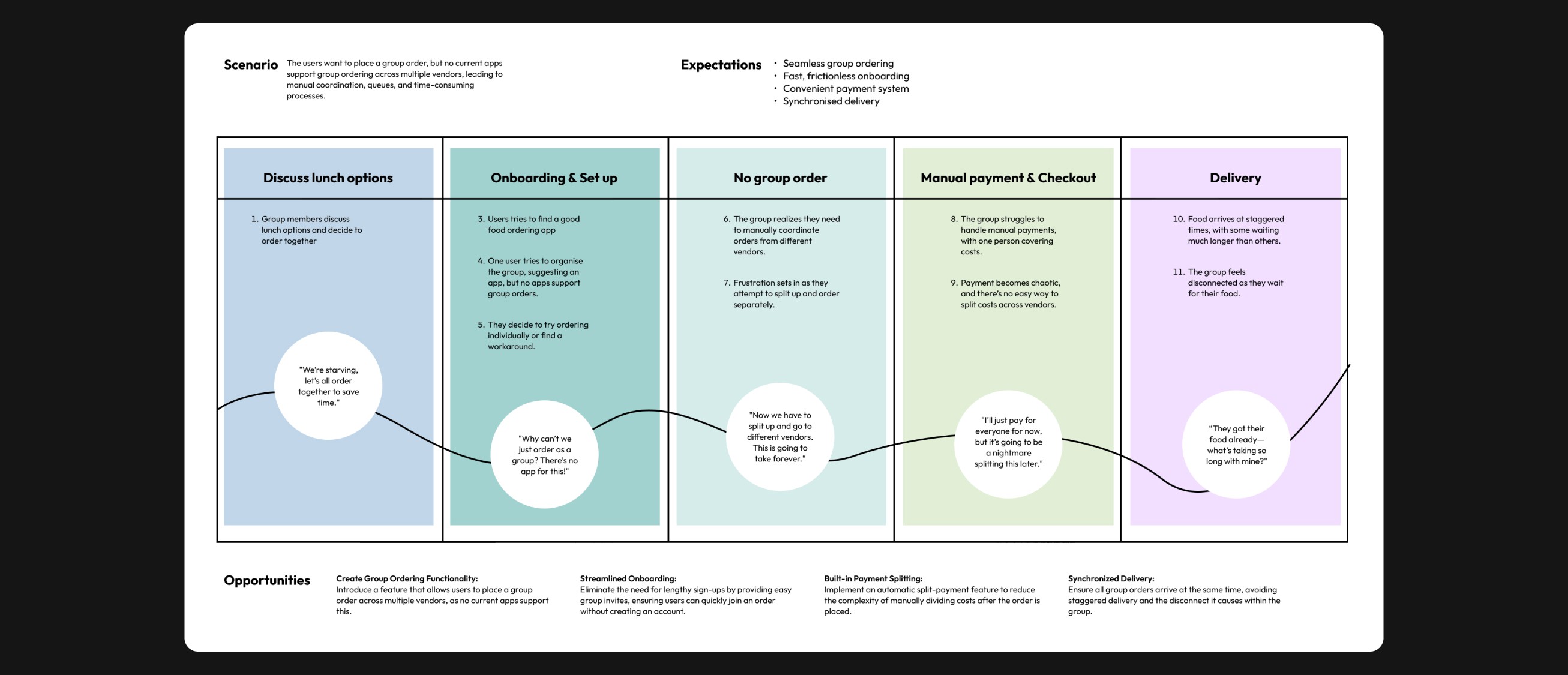
Defining metrics to drive the design process
Defining metrics to drive the design process
These metrics were designed to measure how well the prototype addressed user pain points around speed, convenience, and the group ordering experience. By establishing clear benchmarks for onboarding time, group order completion rates, and user satisfaction, I ensured that each step of the design process was informed by tangible goals.
These metrics were designed to measure how well the prototype addressed user pain points around speed, convenience, and the group ordering experience. By establishing clear benchmarks for onboarding time, group order completion rates, and user satisfaction, I ensured that each step of the design process was informed by tangible goals.
This helped me evaluate the effectiveness of the wireframes and ensure that the design choices were rooted in solving real user problems.
This helped me evaluate the effectiveness of the wireframes and ensure that the design choices were rooted in solving real user problems.
Metrics:
Onboarding time
The time it takes for users to go from receiving an invite to being ready to place a group order.
Goal: Reduce onboarding time ensuring a smooth and quick onboarding experience.
Task completion rate (Group Order Setup)
The rate at which users are able to successfully complete the setup of a group order without encountering issues.
Goal: Achieve a 90% task completion rate during usability testing.
Time to place an order
The total time users take to add items to the cart and complete the order setup.
Goal: Reduce the total time for group order placement, emphasizing ease and efficiency.
Navigation efficiency
How easily users navigate through the prototype to perform tasks like selecting vendors, inviting colleagues, and completing the order.
Goal: Ensure users can navigate the prototype smoothly, with minimal confusion or backtracking.
Metrics:
Onboarding time
The time it takes for users to go from receiving an invite to being ready to place a group order.
Goal: Reduce onboarding time ensuring a smooth and quick onboarding experience.
Task completion rate (Group Order Setup)
The rate at which users are able to successfully complete the setup of a group order without encountering issues.
Goal: Achieve a 90% task completion rate during usability testing.
Time to place an order
The total time users take to add items to the cart and complete the order setup.
Goal: Reduce the total time for group order placement, emphasizing ease and efficiency.
Navigation efficiency
How easily users navigate through the prototype to perform tasks like selecting vendors, inviting colleagues, and completing the order.
Goal: Ensure users can navigate the prototype smoothly, with minimal confusion or backtracking.
These metrics informed the wireframing phase, where I focused on translating these measurable goals into concrete design elements.
These metrics informed the wireframing phase, where I focused on translating these measurable goals into concrete design elements.
Laying the blueprint for a frictionless group ordering experience
Laying the blueprint for a frictionless group ordering experience
Based on my research findings, I began sketching initial concepts focused on simplifying group ordering for Canary Wharf professionals.
Based on my research findings, I began sketching initial concepts focused on simplifying group ordering for Canary Wharf professionals.
I wanted to design an intuitive experience that made inviting colleagues and managing orders easy. My wireframes reflected these goals, focusing on a smooth journey from creating groups orders to checkout, while reducing any unnecessary friction.
I wanted to design an intuitive experience that made inviting colleagues and managing orders easy. My wireframes reflected these goals, focusing on a smooth journey from creating groups orders to checkout, while reducing any unnecessary friction.
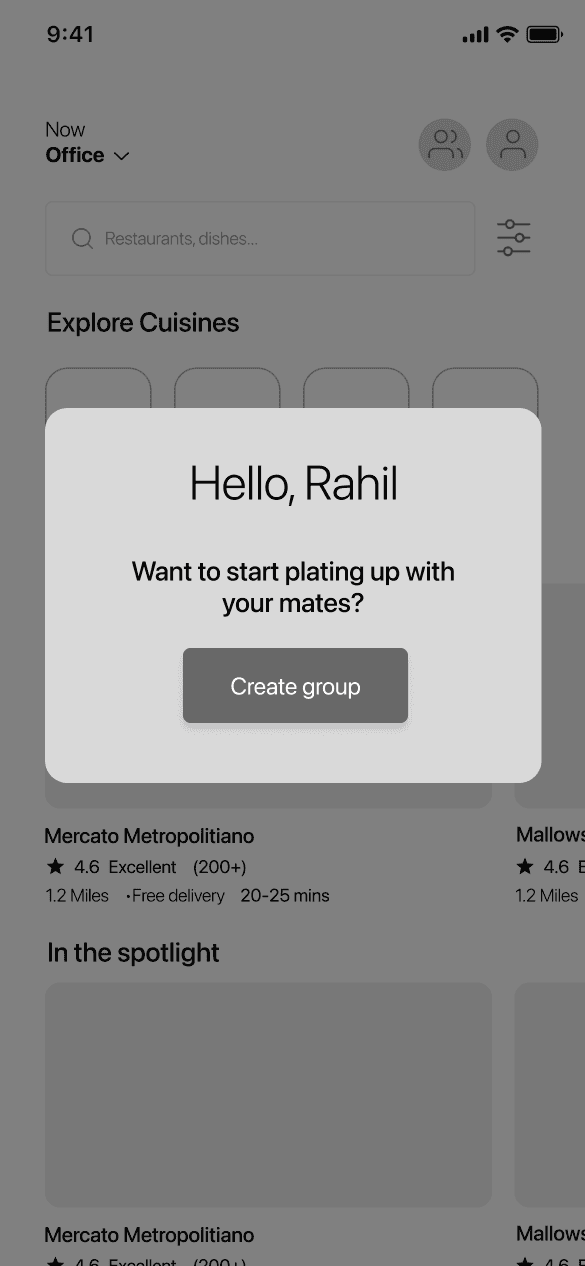

There would be a pop up messaged as soon as the user onboarded the app that prompts it to start creating a group to initiate the order.
There would be a pop up messaged as soon as the user onboarded the app that prompts it to start creating a group to initiate the order.
The user would be guided into a few steps for creating a group by setting up a few details.
The user would be guided into a few steps for creating a group by setting up a few details.
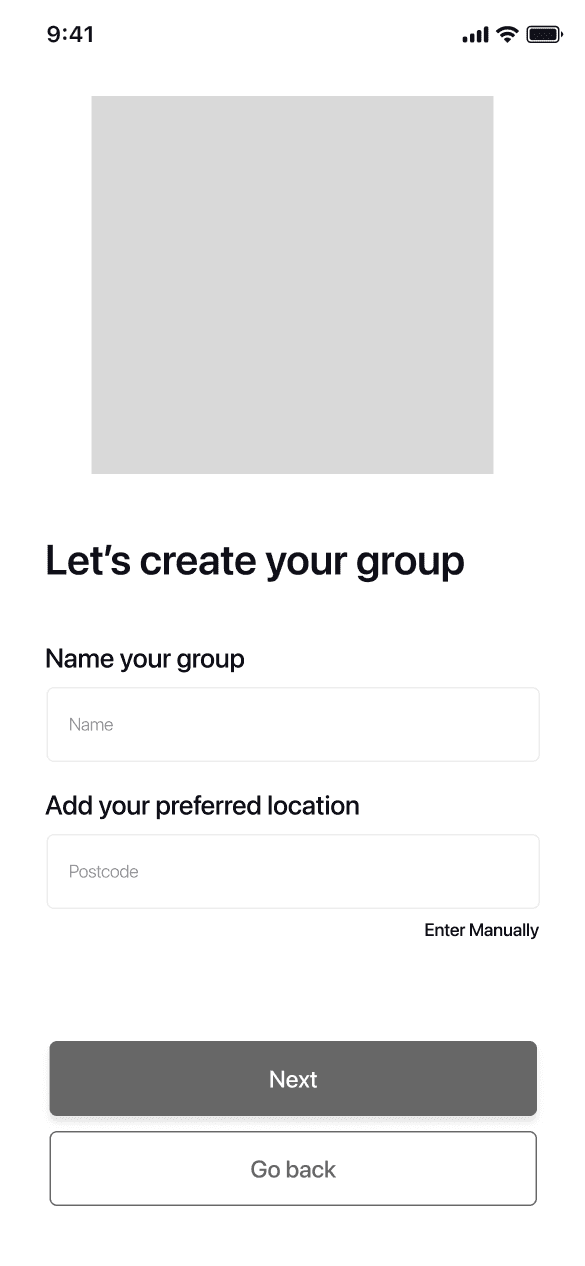

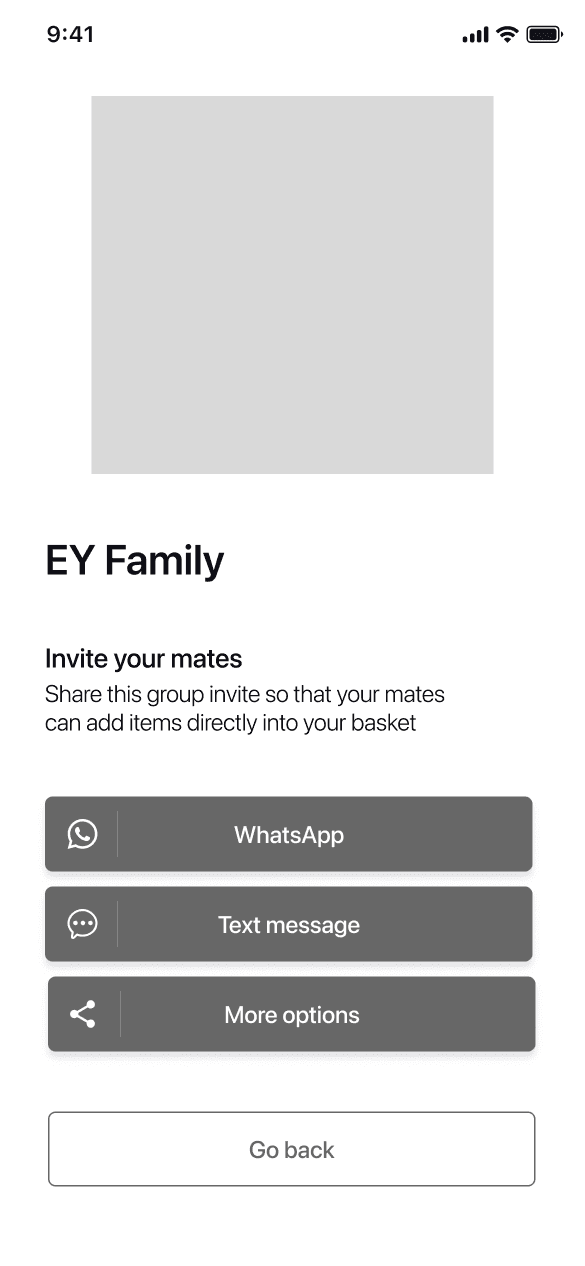

In the final step of group creation, the user is prompted to invite its colleagues via socials, where a group link would be sent over to join the group order.
Once the group participant has joined using the group order link, they will be able to browse through a number of vendors available near to their workplace enabling participants to add food to the cart.
Once the group participant has joined using the group order link, they will be able to browse through a number of vendors available near to their workplace enabling participants to add food to the cart.
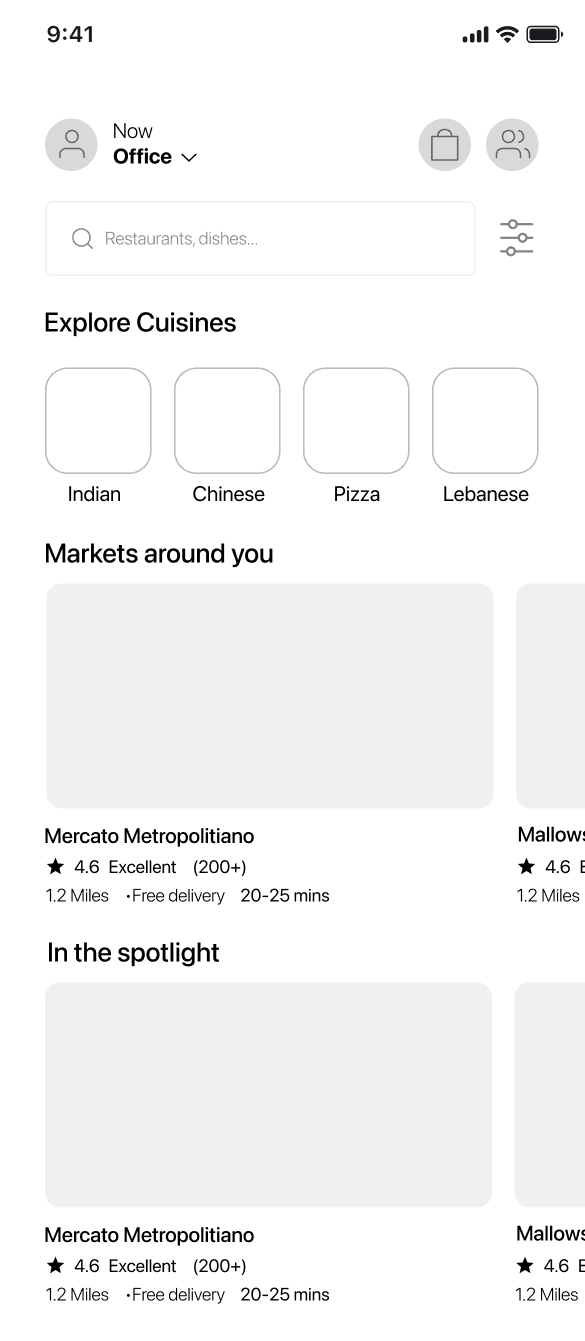

Stimulating the first group ordering experience with users
Stimulating the first group ordering experience with users
After finalizing the wireframes, I moved into prototyping. The interactive prototype allowed me to simulate the group ordering experience and test features like inviting colleagues, selecting vendors, and adding items to a group cart.
After finalizing the wireframes, I moved into prototyping. The interactive prototype allowed me to simulate the group ordering experience and test features like inviting colleagues, selecting vendors, and adding items to a group cart.
I gathered early feedback, which helped me refine the design and identify areas that needed improvement before moving into usability testing.
I gathered early feedback, which helped me refine the design and identify areas that needed improvement before moving into usability testing.

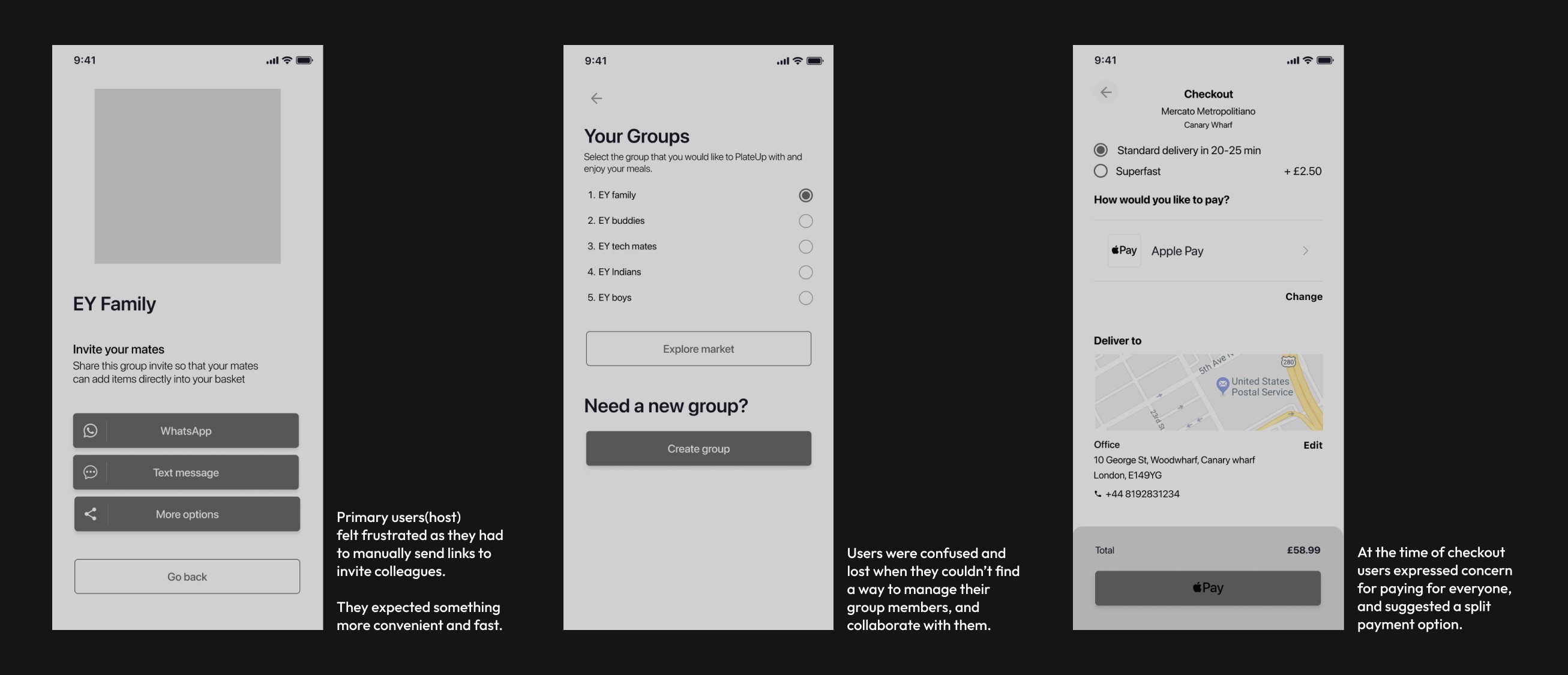
Confusion and feature requests uncovered
Confusion and feature requests uncovered
Usability tests revealed that most users were confused about how to find and manage group members during the ordering process. Many also requested a group chat feature to collaborate in real time, while others wanted a split-payment option to divide costs among participants.
Usability tests revealed that most users were confused about how to find and manage group members during the ordering process. Many also requested a group chat feature to collaborate in real time, while others wanted a split-payment option to divide costs among participants.
These insights drove me to add group member visibility, integrate a chat feature, and implement split payments, ensuring a more intuitive and user-friendly experience.
These insights drove me to add group member visibility, integrate a chat feature, and implement split payments, ensuring a more intuitive and user-friendly experience.
" Well, how do I figure out who’s in the group. A chat feature would help us coordinate better. "
" Well, how do I figure out who’s in the group. A chat feature would help us coordinate better. "
" Well, how do I figure out who’s in the group. A chat feature would help us coordinate better. "
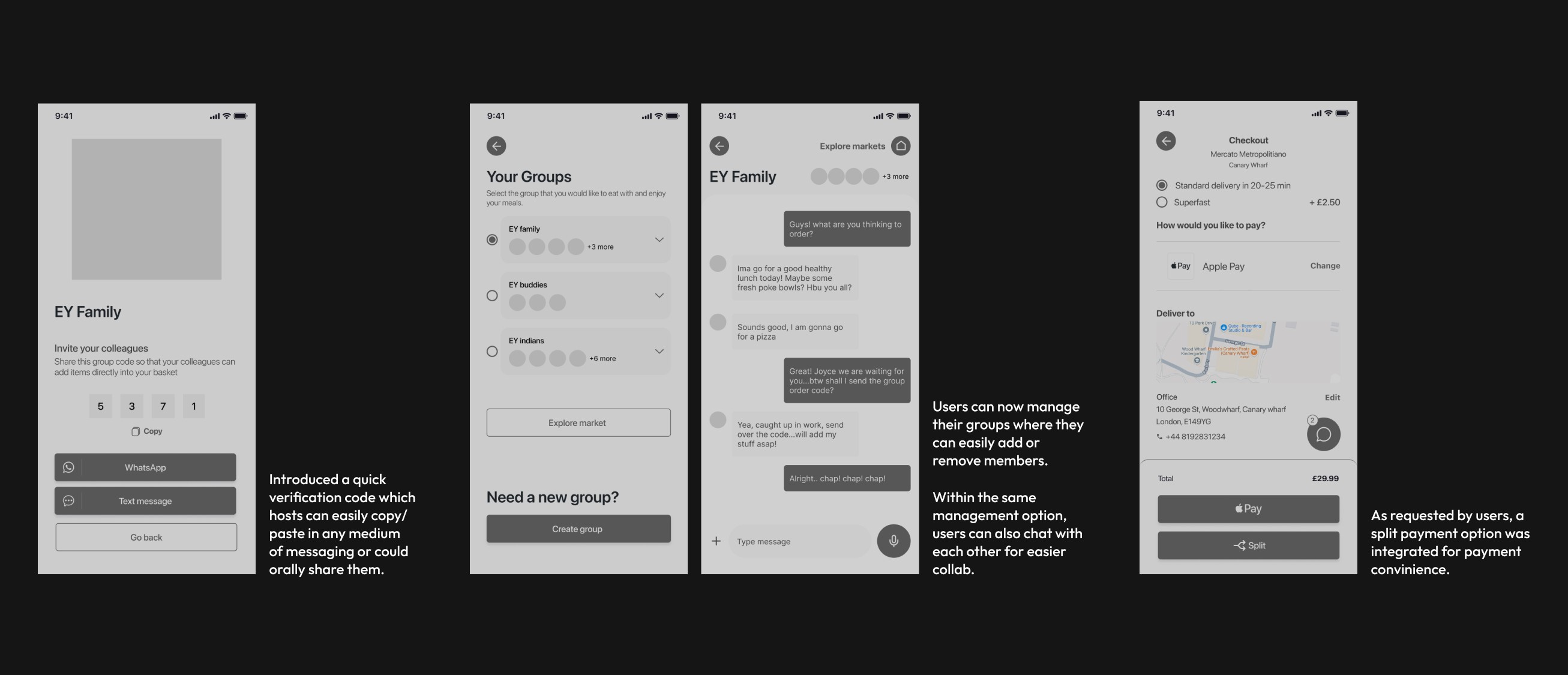
Transforming chaos into simplicity – The final designs
Transforming chaos into simplicity – The final designs
After several rounds of iteration and testing, I finalized the CoCravings design, transforming the chaotic process of group ordering into a seamless and efficient experience.
After several rounds of iteration and testing, I finalized the CoCravings design, transforming the chaotic process of group ordering into a seamless and efficient experience.
The final design includes group member management, real-time chat, and split payments, solving the key pain points professionals faced. Now, users can enjoy a streamlined lunch break, without the stress of long queues or complicated group orders.
The final design includes group member management, real-time chat, and split payments, solving the key pain points professionals faced. Now, users can enjoy a streamlined lunch break, without the stress of long queues or complicated group orders.
User will be guided through a series of onboarding steps where they will be creating their first group, by adding group members with a unique link.
User will be guided through a series of onboarding steps where they will be creating their first group, by adding group members with a unique link.
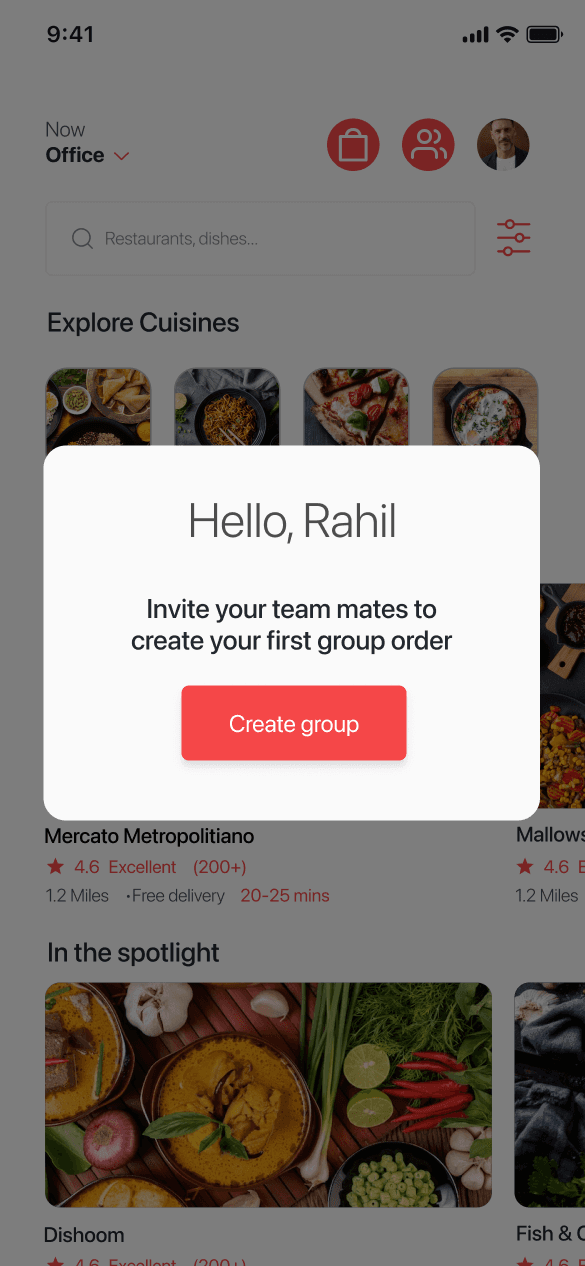

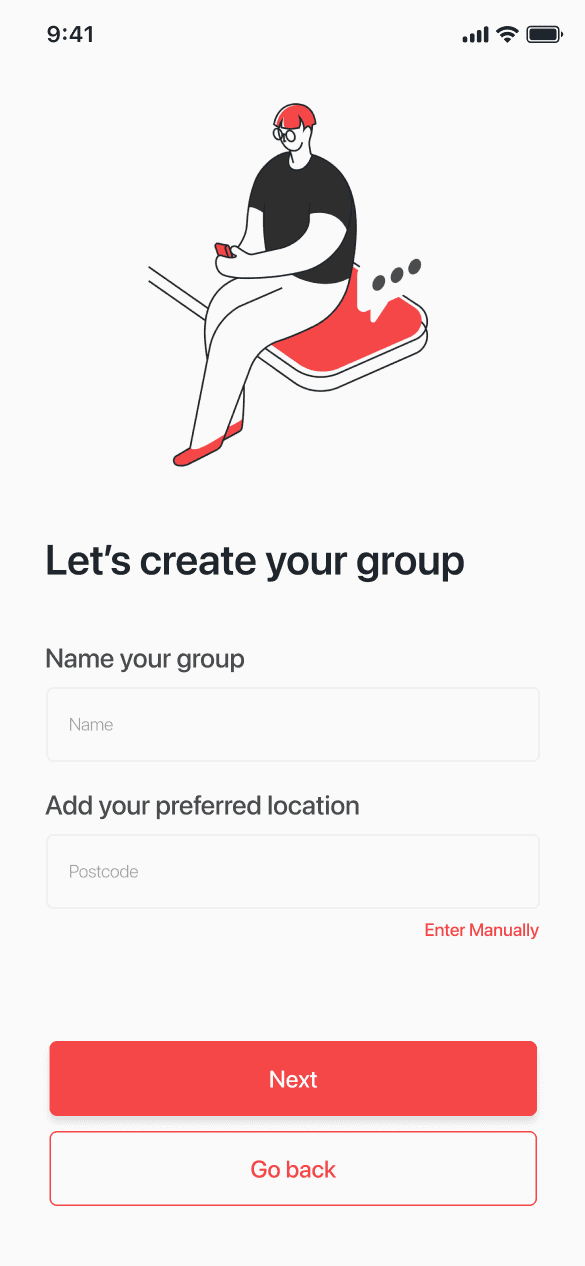

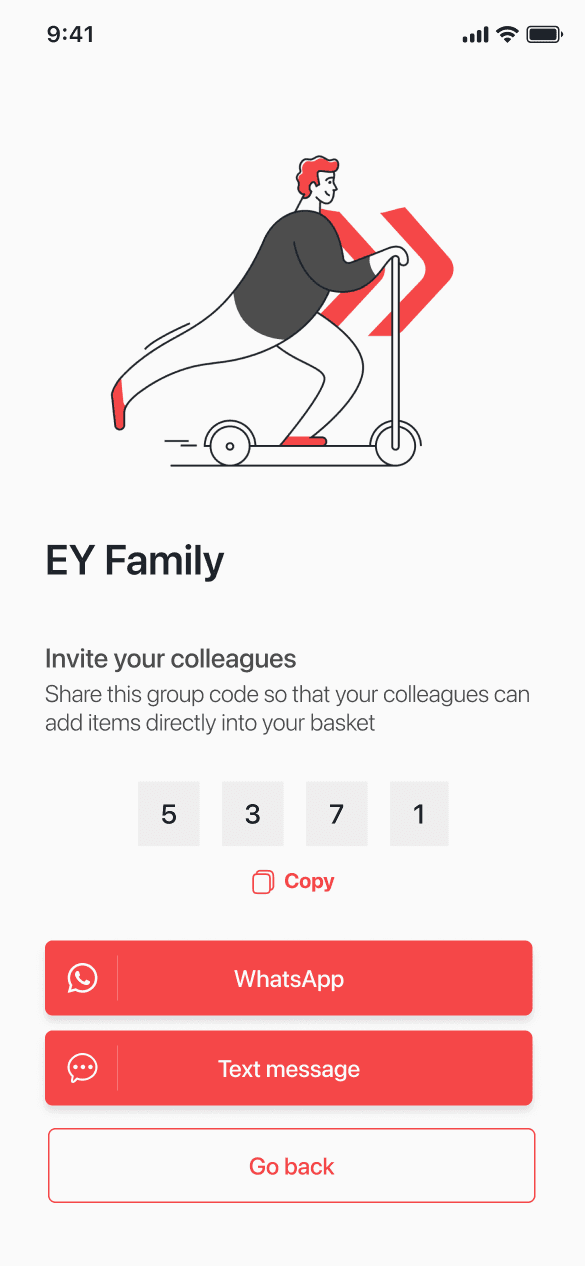

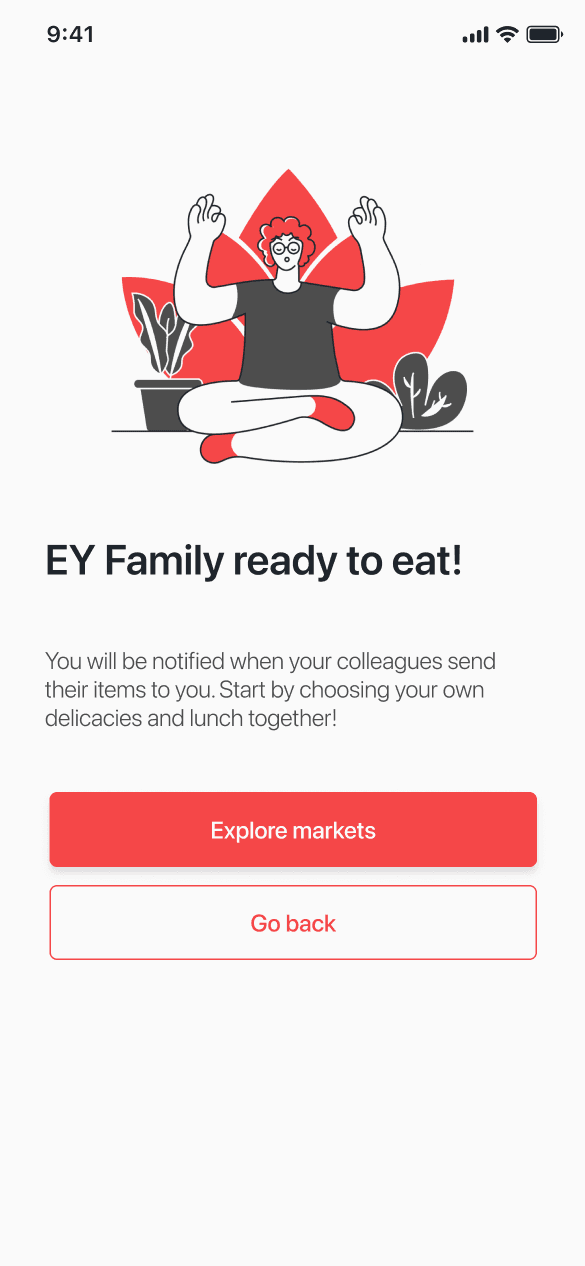

Once the host user has sent an invite link to the participant user, the participant user will be taken to the screen where they can input the code and be able to join the group to add food to the group cart.
Once the host user has sent an invite link to the participant user, the participant user will be taken to the screen where they can input the code and be able to join the group to add food to the group cart.
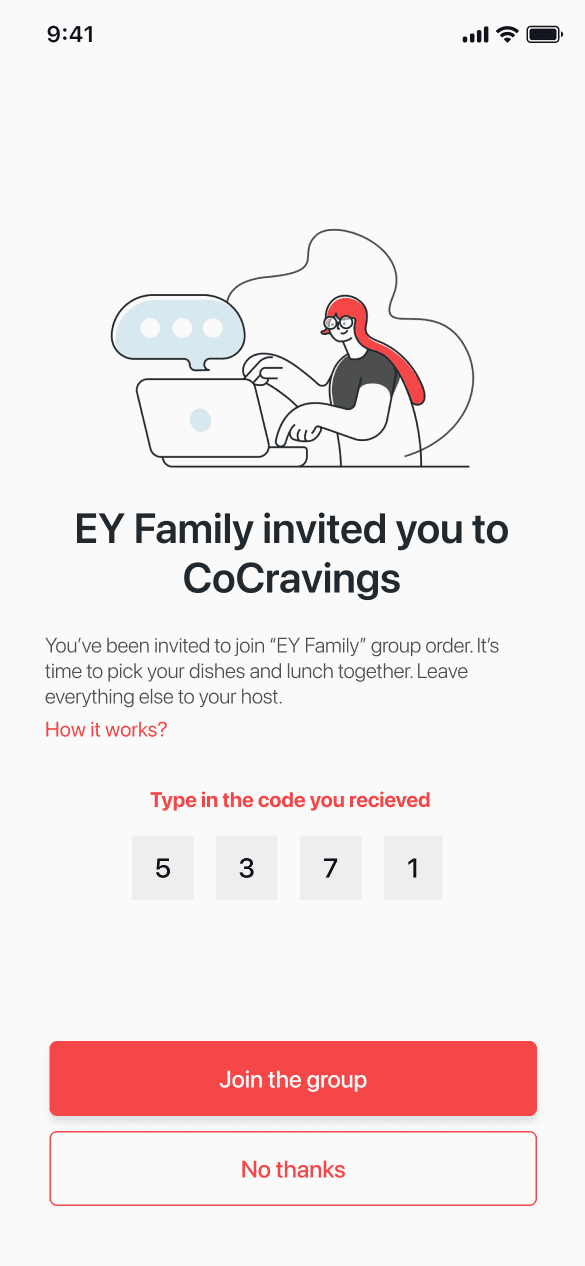

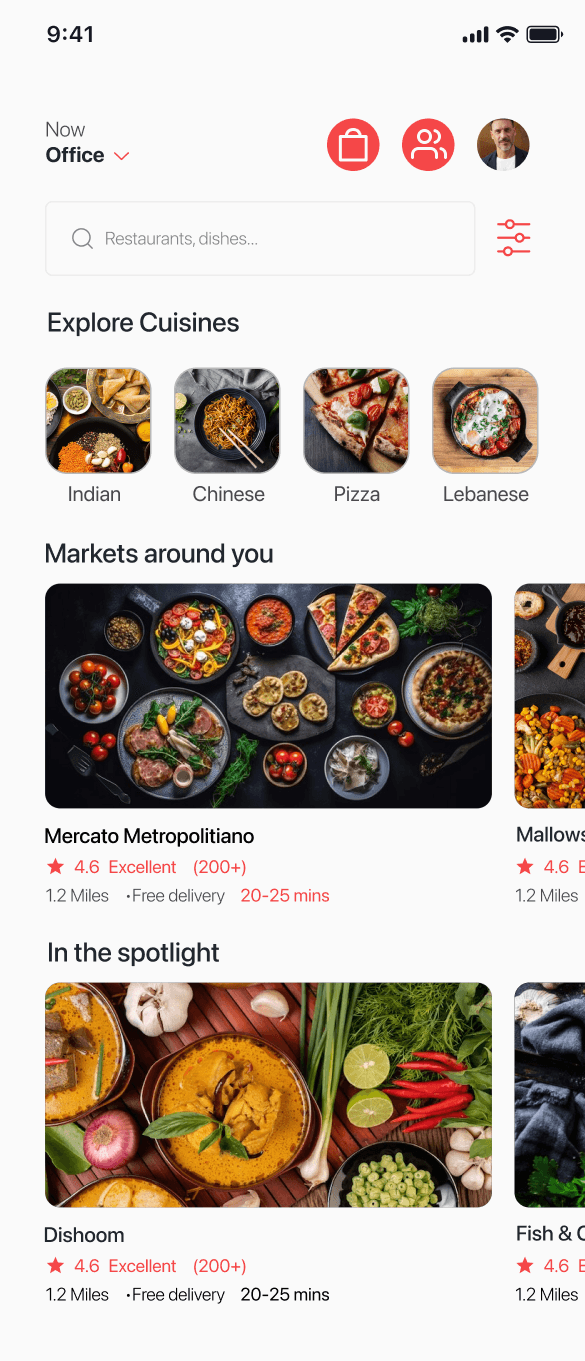

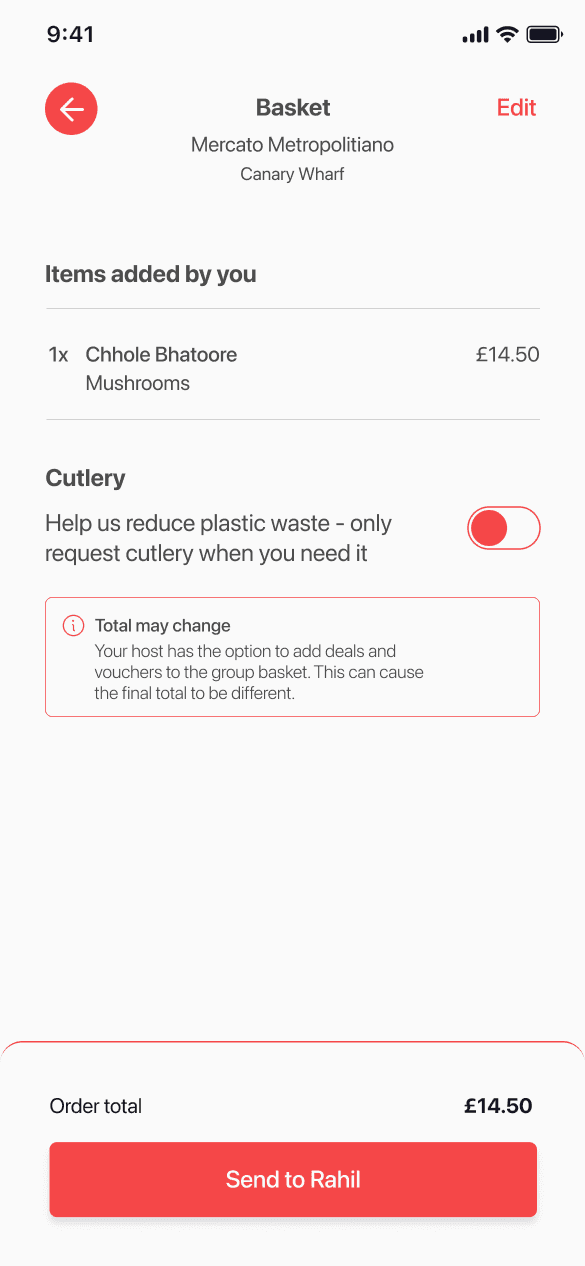

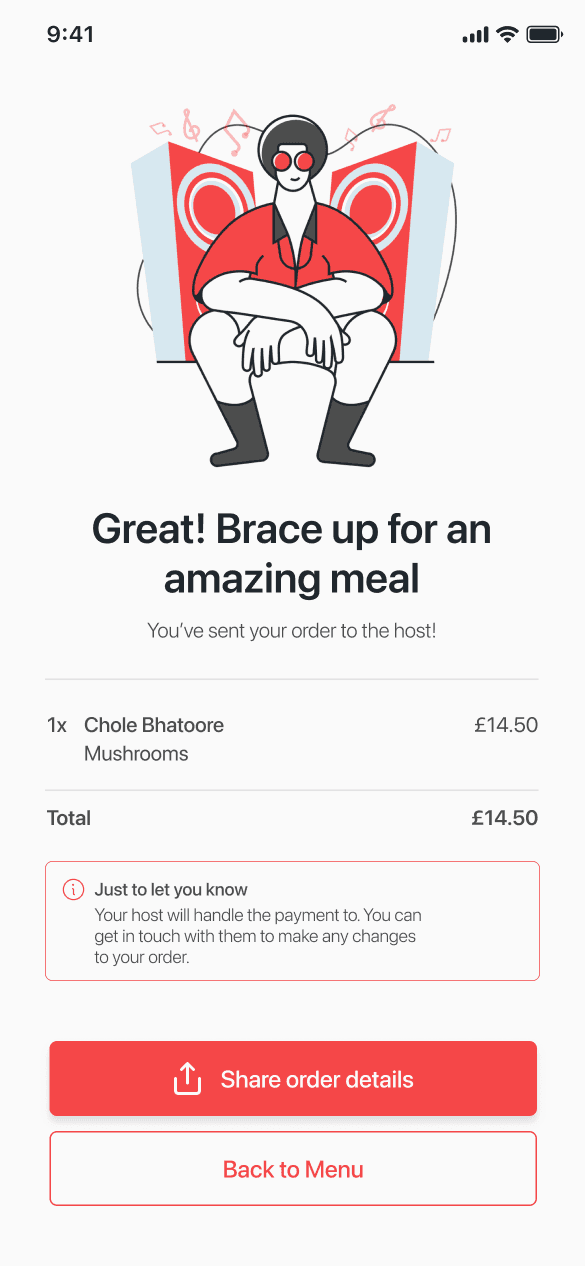

Usually it becomes difficult to collaborate on orders with colleagues sitting in different desks at workplaces, while also switching between apps is a task. To solve this issue, I added a chat feature that can be accessed by selecting a particular group to ease the communication while ordering.
Usually it becomes difficult to collaborate on orders with colleagues sitting in different desks at workplaces, while also switching between apps is a task. To solve this issue, I added a chat feature that can be accessed by selecting a particular group to ease the communication while ordering.
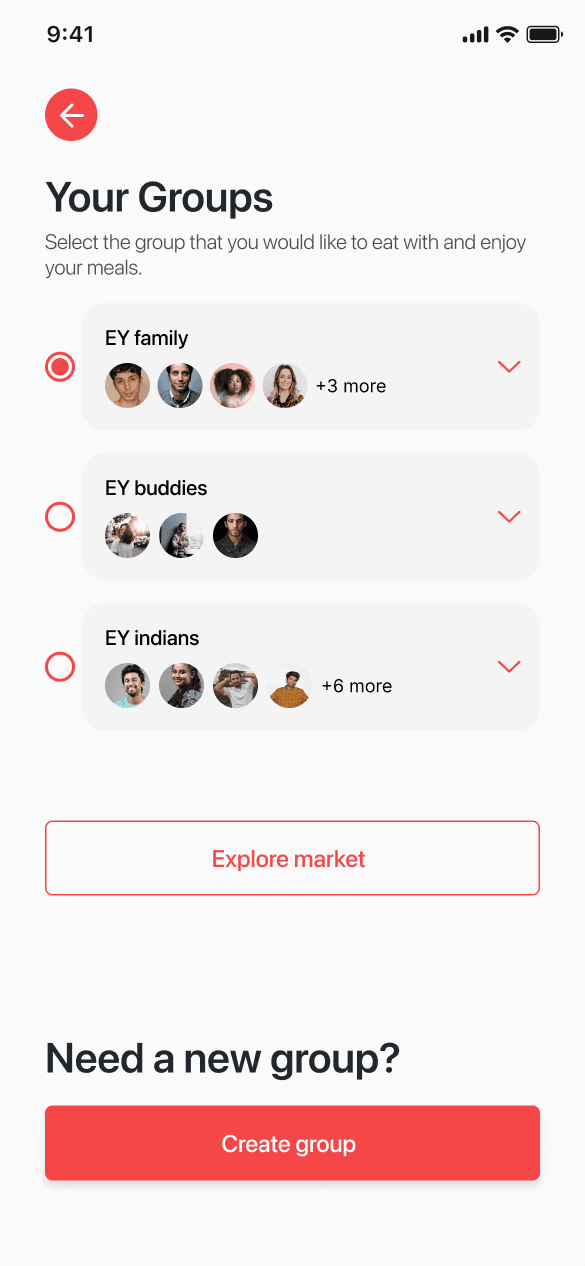

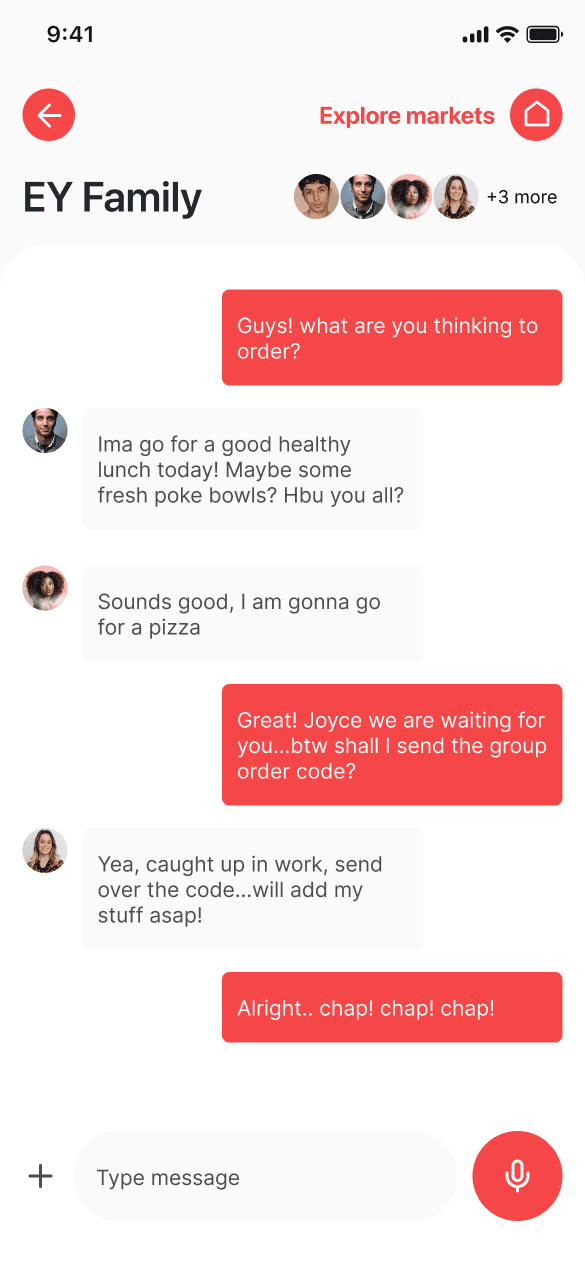

Eventhough the group ordering is sorted but my journey still continues
Eventhough the group ordering is sorted but my journey still continues
Designing CoCravings has been my journey of transforming the chaotic lunch breaks of Canary Wharf professionals into an efficient, seamless experience. By addressing the core pain points—long queues, lack of group ordering from multiple vendors, and inefficient coordination—I’ve created a platform that simplifies group ordering, enhances vendor variety, and reduces stress during limited lunch breaks.
Designing CoCravings has been my journey of transforming the chaotic lunch breaks of Canary Wharf professionals into an efficient, seamless experience. By addressing the core pain points—long queues, lack of group ordering from multiple vendors, and inefficient coordination—I’ve created a platform that simplifies group ordering, enhances vendor variety, and reduces stress during limited lunch breaks.
However, while I’ve solved a significant portion of the problem, the challenge of managing logistics on the backend remains. To fully realize the potential of CoCravings, I need to focus on how orders are distributed to multiple vendors and refine the delivery process. With this in place, CoCravings will provide a complete end-to-end solution, allowing professionals to enjoy their lunches without time constraints or operational hurdles.
However, while I’ve solved a significant portion of the problem, the challenge of managing logistics on the backend remains. To fully realize the potential of CoCravings, I need to focus on how orders are distributed to multiple vendors and refine the delivery process. With this in place, CoCravings will provide a complete end-to-end solution, allowing professionals to enjoy their lunches without time constraints or operational hurdles.
Key improvements for the next phase
Key improvements for the next phase
To ensure smooth operations, we need to focus on order distribution, vendor coordination, and delivery logistics. A centralized system is essential for breaking down group orders and distributing them to multiple vendors seamlessly. Vendors will need a real-time dashboard to manage incoming orders and synchronize preparation times, ensuring everything is ready for pickup together.
Additionally, we’ll need to decide whether to implement an in-house delivery team for better control or partner with a dedicated third-party service for scalability.
To ensure smooth operations, we need to focus on order distribution, vendor coordination, and delivery logistics. A centralized system is essential for breaking down group orders and distributing them to multiple vendors seamlessly. Vendors will need a real-time dashboard to manage incoming orders and synchronize preparation times, ensuring everything is ready for pickup together.
Additionally, we’ll need to decide whether to implement an in-house delivery team for better control or partner with a dedicated third-party service for scalability.
